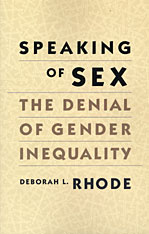
As a gateway to economic opportunity, a college degree is viewed by many as America’s great equalizer. And it’s true: wealthier, more connected, and seemingly better-qualified students earn exactly the same pay as their less privileged peers. Yet, the reasons why may have little to do with bootstraps or self-improvement—it might just be dumb luck. That’s what sociologist Jessi Streib proposes in The Accidental Equalizer, a conclusion she reaches after interviewing dozens of hiring agents and job-seeking graduates.
Streib finds that luck shapes the hiring process from start to finish in a way that limits class privilege in the job market. Employers hide information about how to get ahead and force students to guess which jobs pay the most and how best to obtain them. Without clear routes to success, graduates from all class backgrounds face the same odds at high pay. The Accidental Equalizer is a frank appraisal of how this “luckocracy” works and its implications for the future of higher education and the middle class. Although this system is far from eliminating American inequality, Streib shows that it may just be the best opportunity structure we have—for better and for worse.

Educated, white collar professional women carried the most visible banners of feminism. But working class women were a powerful force in the campaign for gender equality. Dennis A. Deslippe explores how unionized wage-earning women led the struggle to place women's employment rights on the national agenda, decisively influencing both the contemporary labor movement and second-wave feminism.
Deslippe's account unravels a complex history of how labor leaders accommodated and resisted working women's demands for change. Through case studies of unions representing packinghouse and electrical workers, Deslippe explains why gender equality emerged as an issue in the 1960s and how the activities of wage-earning women in and outside of their unions shaped the content of the debate. He also traces the fault lines separating working-class women--who sought gender equality within the parameters of unionist principles such as seniority--from middle-class women--who sought an equal rights amendment that would guarantee an abstract equality for all women.
Thoughtful and detailed, "Rights, Not Roses" offers a new look at the complexities of working-class feminism.

Speaking of Sex explores a topic that too often drops out of our discussions when we speak about sex: the persistent problem of sex-based inequality and the cultural forces that sustain it. On critical issues affecting women, most Americans deny either that gender inequality is a serious problem or that it is one that they have a personal or political responsibility to address. In tracing this “no problem” problem, Speaking of Sex examines the most fundamental causes of women’s disadvantages and the inadequacy of current public policy to combat them.
Although in the past quarter-century the United States has made major progress in addressing gender discrimination, women still face substantial obstacles in their private, public, and professional lives. On every significant measure of wealth, power, status, and security, women remain less advantaged than men. Deborah Rhode reveals the ways that the culture denies, discounts, or attempts to justify those inequalities. She shows that only by making inequality more visible can we devise an adequate strategy to confront it.
Speaking of Sex examines patterns of gender inequality across a wide array of social, legal, and public policy settings. Challenging conventional biological explanations for gender differences, Rhode explores the media images and childrearing practices that reinforce traditional gender stereotypes. On policies involving employment, divorce, custody, rape, pornography, domestic violence, sexual harassment, and reproductive choice, Speaking of Sex reveals how we continually overlook the gap between legal rights and daily experience. All too often, even Americans who condemn gender inequality in principle cannot see it in practice—in their own lives, homes, and work environments. In tracing these patterns, Rhode uncovers the deeply ingrained assumptions that obscure and perpetuate women’s disadvantages.
READERS
Browse our collection.
PUBLISHERS
See BiblioVault's publisher services.
STUDENT SERVICES
Files for college accessibility offices.
UChicago Accessibility Resources
home | accessibility | search | about | contact us
BiblioVault ® 2001 - 2024
The University of Chicago Press









